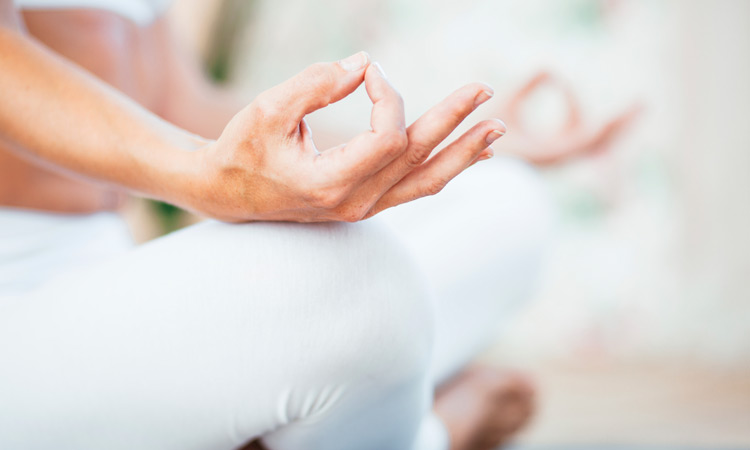 Want a balanced body? How about clarity and reduced stress? Believe it or not meditation can result in these positive benefits. Learning how to meditate can improve a practitioner’s health and create inner peace. Added benefit, you can practice meditation anywhere and at any time. Some studies have found that the practice actually produces changes in brain circuits involved in regulating emotion. Rewire Me spoke with experts to learn more on how meditation can impact health.
Want a balanced body? How about clarity and reduced stress? Believe it or not meditation can result in these positive benefits. Learning how to meditate can improve a practitioner’s health and create inner peace. Added benefit, you can practice meditation anywhere and at any time. Some studies have found that the practice actually produces changes in brain circuits involved in regulating emotion. Rewire Me spoke with experts to learn more on how meditation can impact health.
Personal Best
Dina Kaplan, founder of The Path, turned to meditation after suffering panic attacks while running her last company. According to Kaplan, the benefits of a meditation practice can and do impact and improve health. She says that meditation increases efficiency and helps practitioners to be more focused, calm and relaxed. Kaplan also cites positive results of a meditation practice as allowing the practitioner to make better decisions, have more empathy, be better at negotiating, be more centered and intuitive, and finally, and perhaps most importantly, be a happier person.
Less Stress
 Meditation can be helpful in the reduction of stress, notes Kaplan. “Stress reduces our immunity making us more prone to getting sick. It also shrinks the caps on our DNA, called telomeres, and new research shows that directly leads to signs of aging, including grey hair and even wrinkles,” she explains. “You probably notice your skin starts to look fresher and more beautiful when you’re on vacation. That’s not a coincidence. You look better when you’re more relaxed and that’s because stress actually changes our DNA.”
Meditation can be helpful in the reduction of stress, notes Kaplan. “Stress reduces our immunity making us more prone to getting sick. It also shrinks the caps on our DNA, called telomeres, and new research shows that directly leads to signs of aging, including grey hair and even wrinkles,” she explains. “You probably notice your skin starts to look fresher and more beautiful when you’re on vacation. That’s not a coincidence. You look better when you’re more relaxed and that’s because stress actually changes our DNA.”
“What’s interesting is that stress comes in two forms: actual stress and perceived stress. So you can be under a lot of stress or think you are, and both have negative consequences,” says Kaplan. “Research shows that if you can tell yourself you thrive under stress, or that you know it will lead to a good outcome, you actually reduce the damage stress can cause. So if you have a stressful job, train yourself to smile and enjoy the adrenaline rush.”
Problem Solve
Kaplan says to be thoughtful in solving problems if you have control over a situation. “Some amount of stress can be alleviated if we admit to ourselves that we feel stressed,” says Kaplan. Ask yourself if you want to continue to feel stressed or realize that you have the choice to take a moment to be grateful for the good things going on in life. If you don’t have control, work on training your mind to accept the situation or at least be thoughtful about your emotional response to it.
Be present
 There are many physiological benefits to meditation and science is illuminating more reasons to sit in meditation. Edward Jones, a New York-based yoga teacher and psychoanalyst-in-training says, “the main benefit is the way it helps us become aware of our feeling states, which is a fairly simple concept. If we know how we’re feeling, we have a better chance of understanding why we feel that way. If we understand why, we then have the chance to take better care of ourselves.” Meditation can help us slow down, sit still and tune in to what’s going on in our mind and in our heart with a sense of curiosity and patience.
There are many physiological benefits to meditation and science is illuminating more reasons to sit in meditation. Edward Jones, a New York-based yoga teacher and psychoanalyst-in-training says, “the main benefit is the way it helps us become aware of our feeling states, which is a fairly simple concept. If we know how we’re feeling, we have a better chance of understanding why we feel that way. If we understand why, we then have the chance to take better care of ourselves.” Meditation can help us slow down, sit still and tune in to what’s going on in our mind and in our heart with a sense of curiosity and patience.
Change the brain
This practice of simply noticing how we feel is something we can apply to every part of our lives. Meditation does not suggest that we “should” feel a particular way, says Jones. “Instead, we empower ourselves to make more conscious choices about how we treat ourselves, who we surround ourselves with and what we put in our bodies.” Jones explains that being more attuned to how to nourish the mind and body can make us become healthier—this kind of self-care to be more sustainable and have more impact.
If you need any more information, you can find me on my meditation cushion, inhaling improved health and expelling anything my body no longer needs. Now that alone is reason for you to get started.


